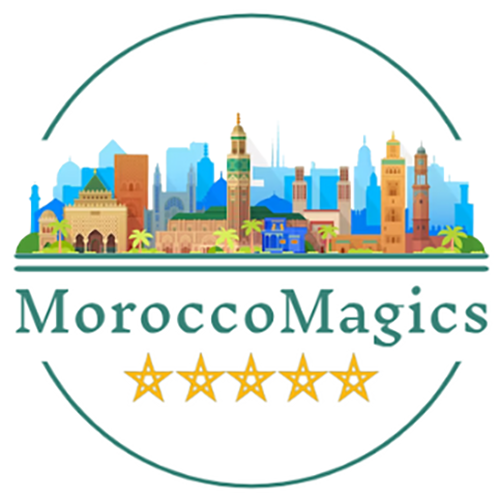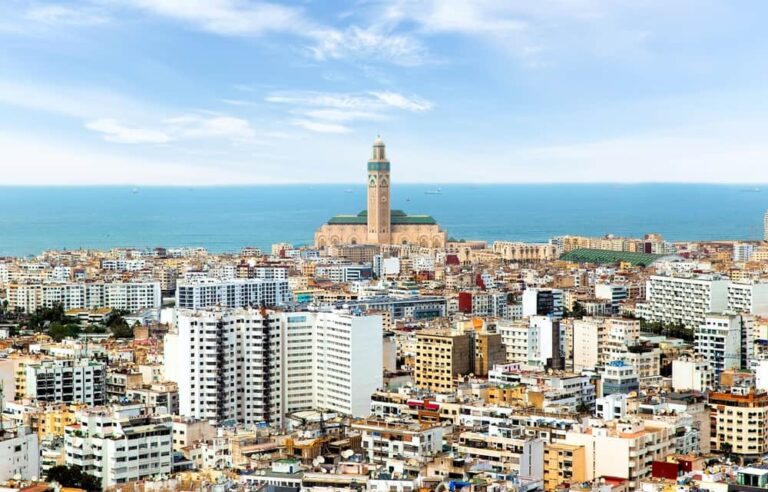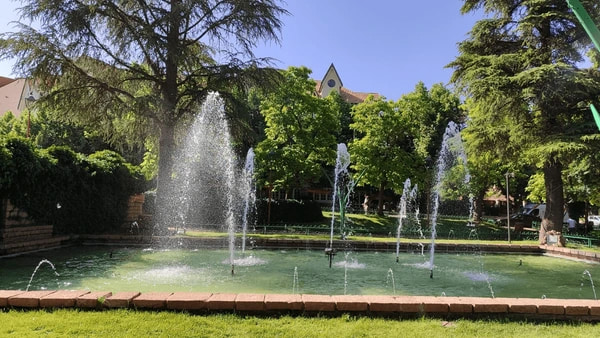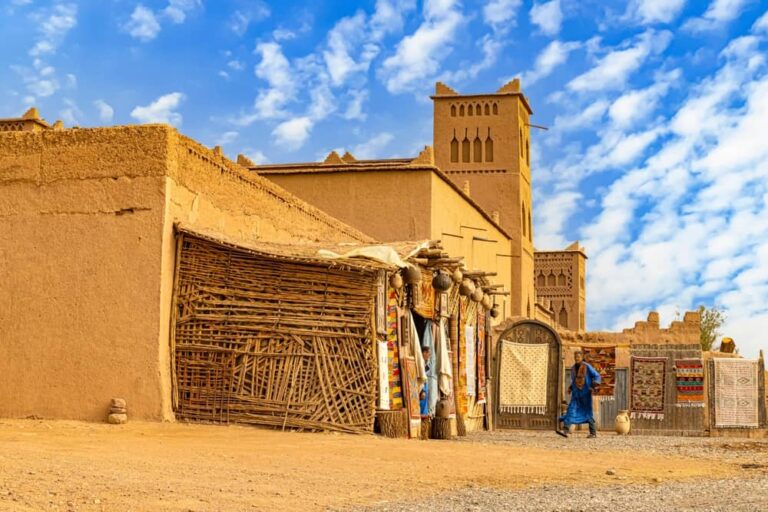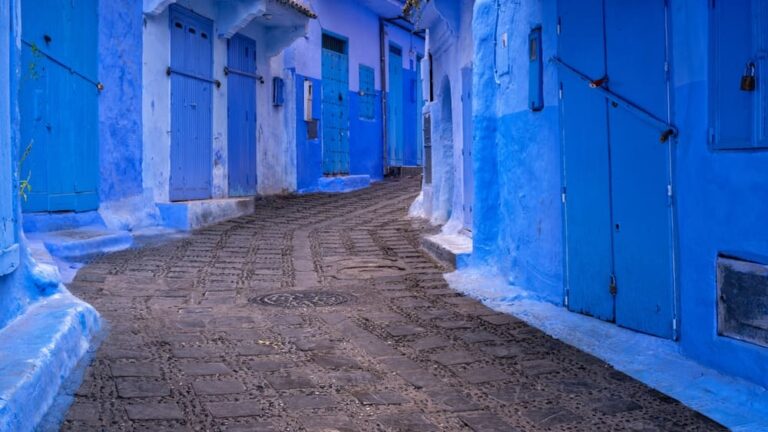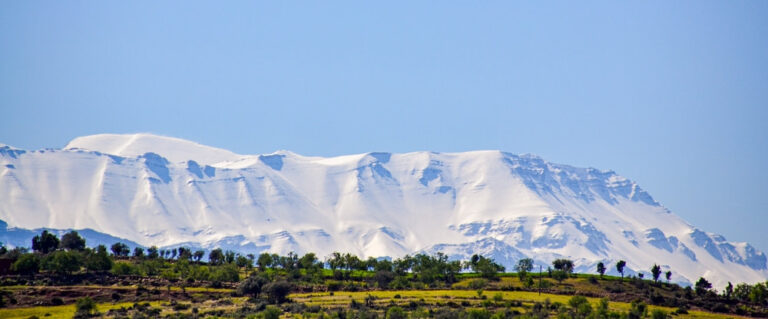Essaouira Travel Guide
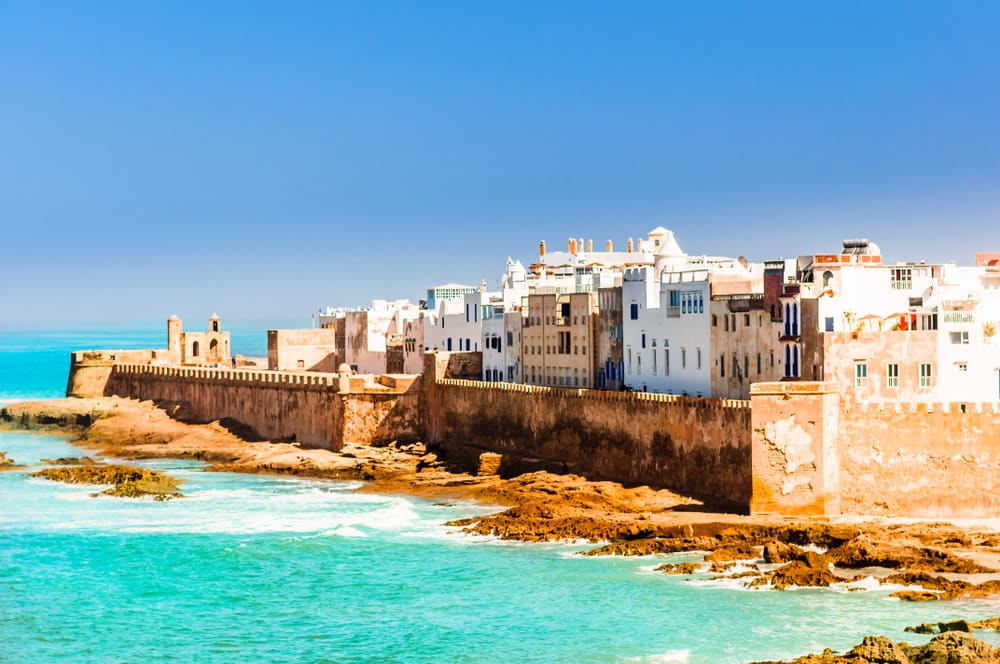
Essaouira is a charming coastal town on Morocco’s Atlantic coast, known for its rich history, vibrant culture, and unique atmosphere. This city, often called the “Windy City” due to its breezy conditions, has long attracted travelers with its blend of old-world charm and modern activities. It was once a key port for traders and has been influenced by various cultures over the centuries, including the Carthaginians, Portuguese, and French.
Today, Essaouira is a UNESCO World Heritage Site, famous for its well-preserved medina, bustling fish markets, and impressive fortress walls that still stand tall. Visitors can explore the city’s narrow streets, taste fresh seafood, and experience traditional Moroccan life. It’s a great place for those who love history, art, and outdoor activities like kite surfing and quad-biking.
Whether you’re planning to visit the beaches, the food, or the cultural landmarks, Essaouira has something for everyone. Ready to explore further? Next, we’ll cover how to get to Essaouira, including tips for international and domestic travel.
Getting to Essaouira
Essaouira, located on Morocco’s Atlantic coast, is accessible through multiple travel options, both internationally and domestically. Whether you’re arriving from another country or traveling within Morocco, getting to Essaouira is convenient with a variety of choices.
International Travel Options to Morocco
To reach Essaouira from overseas, you will likely need to fly into one of Morocco’s major international airports and then take a domestic connection or ground transportation.
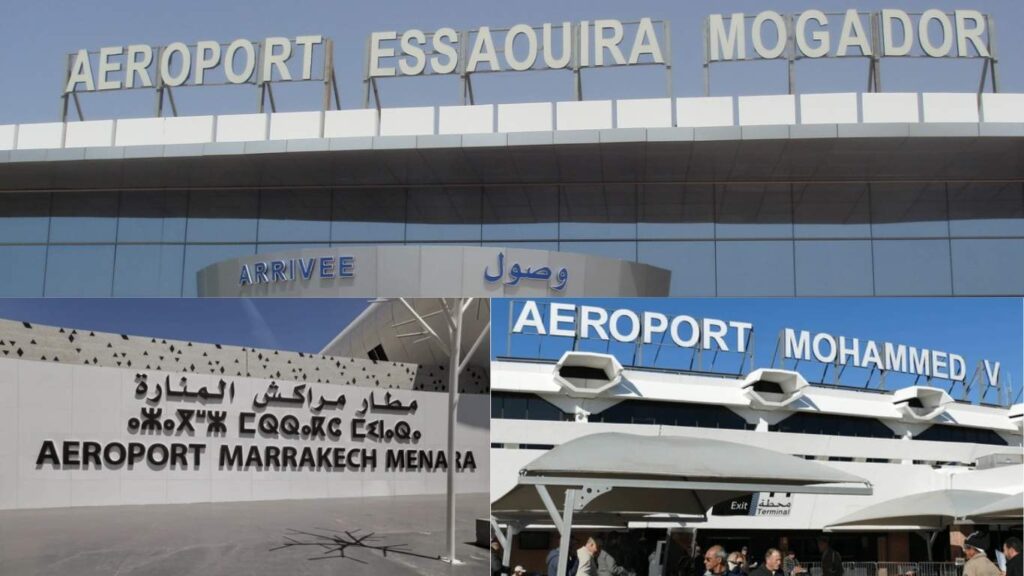
Marrakech Menara Airport (RAK): This is the closest major international airport to Essaouira, located approximately 180 km away, making it a popular gateway for visitors. Marrakech Menara offers direct flights from major European cities such as Paris, London, Madrid, and Berlin. Once you arrive in Marrakech, you can easily reach Essaouira by bus, taxi, or rental car. The drive takes about 2.5 to 3 hours.
Casablanca Mohammed V International Airport (CMN): Casablanca’s international airport is a larger hub with flights from North America, Europe, and Africa. Although it’s farther from Essaouira (around 370 km), it’s still a good option for travelers, especially those coming from non-European countries. From Casablanca, you can take a connecting domestic flight to Marrakech or use ground transportation, such as a train to Marrakech, and then a bus or car to Essaouira.
Essaouira-Mogador Airport (ESU): Although small, Essaouira does have its own airport. It primarily serves domestic flights and a few international routes, mostly from Europe. If you’re lucky to find a direct flight to Essaouira, this airport is only 20 minutes from the city center by car.
Domestic Travel: Routes from Major Cities
Essaouira is well-connected to major Moroccan cities through a network of buses, trains, and rental car options.
From Marrakech: This is the most common route for travelers coming to Essaouira. Supratours and CTM bus services operate several trips daily, making the 2.5 to 3-hour journey comfortable with air-conditioned buses. Renting a car is another option if you prefer the freedom to explore en route. The road from Marrakech to Essaouira is well-maintained, offering scenic views of the Moroccan countryside.
From Casablanca: Traveling from Casablanca involves a longer journey. You can take a direct bus, which will take approximately 6 hours, or a train from Casablanca to Marrakech, followed by a bus or car ride from Marrakech to Essaouira. If you choose to drive, it’s a 5-hour trip by car, mostly on highways.
From Fez: Fez is located further inland, and getting to Essaouira from Fez is more time-consuming. The most efficient way is to take a domestic flight to Marrakech, then continue by bus or car to Essaouira. Alternatively, you can take a train or bus to Marrakech and then make the final leg of the journey to Essaouira.
Transportation Tips for Getting to Essaouira
Bus Travel: Supratours and CTM are the most reliable bus services for travelers heading to Essaouira. Both offer comfortable, air-conditioned buses with baggage storage. It’s advisable to book tickets in advance, especially during busy tourist seasons, as buses can fill up quickly.
Driving: Renting a car provides flexibility and allows you to explore the areas around Essaouira at your own pace. Be mindful of rural roads, especially if you plan on taking less-traveled routes, and always carry a GPS or map.
Taxis: If you prefer a private transfer, grand taxis (shared long-distance taxis) are available from Marrakech to Essaouira. Agree on the fare before departure to avoid misunderstandings. Private taxis are more expensive than buses but offer a faster and more direct route.
Best Time to Visit Essaouira
Essaouira is known for its year-round mild climate, thanks to its location along the Atlantic coast. While it’s a city you can visit any time of the year, understanding the seasonal differences can help you plan a trip that matches your preferences. Whether you want to experience vibrant local festivals, enjoy outdoor activities, or simply relax in a quieter setting, choosing the right time to visit can enhance your experience.
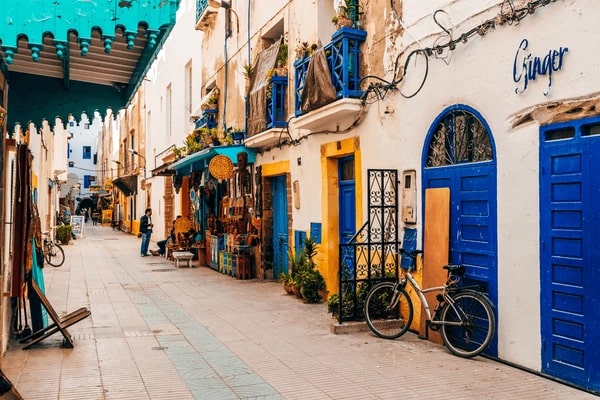
Ideal Seasons and Weather
Essaouira has a temperate oceanic climate that ensures moderate temperatures throughout the year. The coastal breeze, especially the alizee winds, keeps it cooler than inland cities like Marrakech or Fez. This breeze makes the city especially popular among surfers and kite surfers, but it can also be a consideration for those who prefer calmer weather. Let’s break down the weather by season to help you decide when to visit.
Spring (March to May):
Spring is one of the best times to visit Essaouira. During these months, temperatures range between 18°C to 25°C (64°F to 77°F). The weather is pleasant, with sunny days and cool breezes from the Atlantic, making it perfect for sightseeing, exploring the medina, and enjoying outdoor activities like hiking or camel rides on the beach. Spring also sees fewer tourists compared to the summer, allowing you to experience a more authentic, relaxed version of the city. Additionally, many flowers are in bloom, adding color to the landscape.
Summer (June to August):
Summer in Essaouira is noticeably cooler than in other parts of Morocco, with temperatures generally ranging from 22°C to 27°C (72°F to 81°F). The strong Atlantic breezes, known locally as “alizee winds,” make the city feel comfortable, even during the hottest months. While these winds make Essaouira a haven for kite surfing and windsurfing enthusiasts, they may not be ideal for visitors looking for a typical beach experience, as the wind can make sunbathing less enjoyable. Despite this, summer is the peak tourist season, especially among Europeans, so expect larger crowds, especially during the Gnaoua World Music Festival in June.
Autumn (September to November):
Autumn is another excellent time to visit Essaouira. The weather remains pleasant, with temperatures similar to those in spring, ranging from 19°C to 24°C (66°F to 75°F). The summer crowds have dissipated, offering a more tranquil experience. This season is perfect for travelers who want to enjoy the city’s cultural and historical attractions without the bustling atmosphere of summer. It’s also a great time for outdoor activities like surfing, quad biking, and horseback riding. The mild temperatures and breezy conditions make it comfortable to explore the medina and its surroundings.
Winter (December to February):
Winter in Essaouira is mild, with temperatures ranging between 12°C to 18°C (54°F to 64°F). Though it’s not as warm as the other seasons, the city remains a pleasant destination, especially for those seeking to avoid the colder climates in Europe or North America. Winter is the least crowded time to visit Essaouira, so you can explore the medina and other attractions without the hustle and bustle of peak tourist seasons. However, it can be quite windy, and evenings tend to be chilly, so packing a warm jacket is essential. Winter visitors can also enjoy discounted hotel rates and a more relaxed atmosphere.
Festivals and Events to Experience
Essaouira is not only famous for its picturesque scenery and mild weather but also for its vibrant cultural scene. The city hosts several festivals throughout the year, attracting visitors from all over the world. If you’re interested in music, art, or sports, planning your trip around one of these festivals can add a unique cultural dimension to your visit.
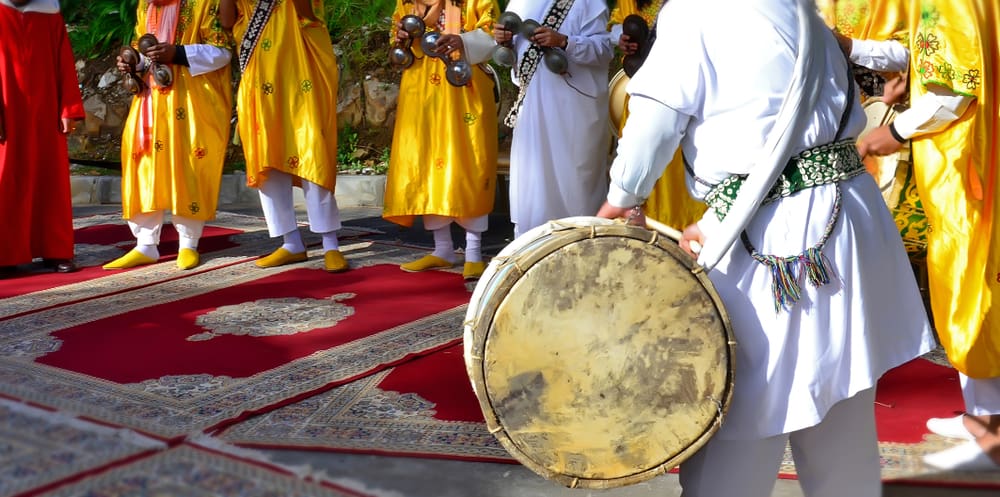
Gnaoua World Music Festival (June):
The Gnaoua World Music Festival is Essaouira’s most famous event and a major draw for visitors in the summer. Held annually in late June, the festival celebrates Gnaoua music, a unique blend of African, Berber, and Islamic spiritual rhythms. The event has expanded to include jazz, blues, reggae, and rock performances, attracting international artists. For four days, the city transforms into an open-air concert venue, with performances in the medina’s squares, along the beach, and at historic sites like the Skala de la Ville. The festival is free, and the streets are filled with music, dancing, and celebration. It’s one of the most vibrant times to experience Essaouira’s lively atmosphere, but accommodations can be harder to find, so it’s advisable to book in advance.
Festival des Alizés (April):
For a more refined cultural experience, the Festival des Alizés is a classical music event that takes place in April. This festival attracts internationally renowned musicians and offers a more intimate and elegant experience compared to the lively Gnaoua Festival. Concerts are held in historical venues such as Essaouira’s riads and cultural centers, providing a magical backdrop for the performances. The festival celebrates both classical and Moroccan music, blending the two to create a unique auditory experience. If you’re a fan of classical music, visiting Essaouira during the Festival des Alizés is a treat.
Mogador Marathon (January):
Sports enthusiasts visiting in January can participate in or watch the Mogador Marathon. The marathon takes runners through the city’s scenic landscapes, including the beach, countryside, and historical landmarks. The event also includes shorter races for those not looking to run the full marathon. It’s a great way to see more of Essaouira’s natural beauty while engaging in a fun and competitive event. The cool winter temperatures make it an ideal time for running, and the city’s relatively flat terrain ensures that the race is accessible to runners of all levels.
Moga Festival (October):
The Moga Festival is a newer event in Essaouira that celebrates electronic music and digital arts. Held in October, the festival draws a younger, trendier crowd to the city. In addition to music performances, the festival hosts digital art exhibitions, workshops, and talks, making it a more interactive cultural experience. The festival’s name is a nod to Essaouira’s ancient name, Mogador, and it aims to blend the city’s historical roots with modern artistic expression.
Other Seasonal Highlights
Surfing and Water Sports (Year-Round):
While surfing is popular year-round, the best time for windsurfing and kite surfing is during the summer months, thanks to the strong alizee winds. If you’re visiting in the cooler months, traditional surfing and paddleboarding are still excellent activities to try, as the Atlantic Ocean remains consistent in delivering waves.
Birdwatching (March to September):
Birdwatchers will find Essaouira an interesting destination, particularly between March and September. The city and its surrounding areas are home to various migratory bird species, especially around the wetlands and the island of Mogador. Species such as flamingos, egrets, and herons are commonly spotted.
Camel and Horseback Riding (Year-Round):
No matter when you visit, camel and horseback riding along Essaouira’s beach is a popular activity. The cool breeze and scenic views make it enjoyable year-round. Local operators offer both short rides and longer treks into the countryside.
Choosing the Best Time for Your Visit
Ultimately, the best time to visit Essaouira depends on your personal preferences. If you want to experience lively festivals, June and April are excellent choices. For outdoor activities and fewer crowds, spring and autumn are ideal. If you prefer cooler weather and quiet streets, winter provides a serene escape with the added bonus of lower accommodation prices. No matter when you visit, Essaouira’s charm, beauty, and cultural richness will provide a memorable experience.
Where to Stay in Essaouira
Essaouira offers a range of accommodations to fit every traveler’s needs, from luxurious riads to more budget-friendly apartments. Whether you’re looking for a cultural experience or a seaside escape, the city has something for everyone.
Types of Accommodations: Riads, Hotels, and Apartments
Riads: These traditional Moroccan houses are usually located in the medina and are known for their intimate, homely feel. Riads are built around a central courtyard and often feature beautiful Moroccan decor, such as colorful tiles and intricate woodwork. Staying in a riad provides a unique, authentic experience and personalized service. Riads often serve homemade Moroccan breakfasts, including local specialties like fresh bread, mint tea, and jams.
Hotels: Essaouira has several hotels ranging from luxury to budget-friendly options. Larger hotels tend to be located near the beach, offering modern amenities such as pools, restaurants, and spa services. These are ideal for travelers who prefer more standard accommodation with easy beach access.
Apartments: For families, groups, or longer stays, renting an apartment can provide more space and privacy. Many apartments in Essaouira are available through platforms like Airbnb or local rental agencies. This option allows you to cook your own meals and experience life more like a local.
Best Neighborhoods for Visitors
Medina (Old Town): Staying in the medina offers a cultural immersion experience. The narrow, winding streets are filled with local shops, markets, and restaurants. You’ll be within walking distance of key attractions like the Skala de la Ville and the bustling souks. This area is perfect for visitors who want to experience the heart of Essaouira.
Beachfront: If your focus is on beach activities, the beachfront area offers easy access to Essaouira’s sandy shores. Many beachfront hotels have stunning ocean views, and you can find a range of accommodation options here, from luxury hotels to more casual guesthouses.
Top Riads and Hotels to Consider
Riad Baladin: Located in the medina, this riad is known for its cozy atmosphere and friendly staff. The rooftop terrace offers panoramic views of the city, and the traditional Moroccan decor adds to the charm.
Heure Bleue Palais: A luxurious riad featuring modern amenities such as a rooftop pool, spa, and gourmet dining. It’s a great choice for travelers looking for high-end accommodations with an authentic Moroccan touch.
Villa Maroc: One of Essaouira’s most famous riads, Villa Maroc combines traditional Moroccan architecture with modern comforts. Located near the beach, it offers a tranquil retreat with easy access to the medina.
Exploring Essaouira
Essaouira is a city filled with history, culture, and natural beauty. Whether you’re wandering through its medina or enjoying its coastal attractions, there is no shortage of things to see and do.
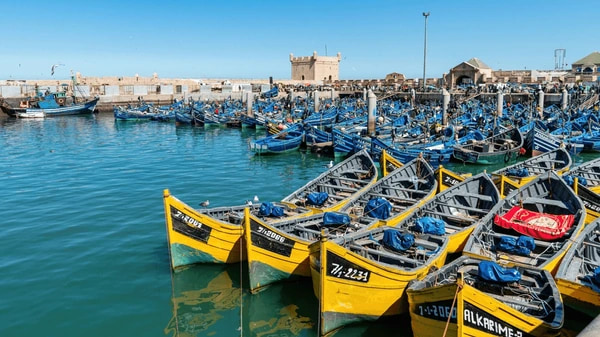
Must-See Attractions: Landmarks and Highlights
Essaouira Medina: A UNESCO World Heritage Site, the medina is one of the city’s most popular attractions. Its narrow, winding streets are filled with local artisans selling everything from handcrafted jewelry to spices. The medina is a great place to get lost in, with hidden cafés and shops waiting to be discovered.
Skala de la Ville: This historic fortress offers some of the best views in Essaouira. Built to protect the city from pirates, the ramparts overlook the Atlantic Ocean and provide stunning views of the coastline. You can walk along the walls and see the cannons that once defended the city.
Fishing Port: Essaouira’s port is the heart of the city’s fishing industry. Here, you can watch fishermen bringing in their daily catch and even sample fresh fish grilled on the spot. The port is bustling with activity and offers a glimpse into the daily life of Essaouira’s residents.
Bab Doukkala Gate: One of the most important entrances to the medina, Bab Doukkala is an iconic structure that has stood for centuries. It’s a beautiful example of Moroccan architecture and a great spot for photos.
Hidden Gems Off the Beaten Path
Jewish Quarter (Mellah): Essaouira once had a thriving Jewish community, and the Mellah is the old Jewish quarter of the city. Though many of the residents have since left, the area is still rich in history and worth exploring for its unique architecture and cultural significance.
Sidi Kaouki Beach: Located about 25 km south of Essaouira, Sidi Kaouki is a quiet beach ideal for those looking to escape the crowds. It’s also popular among surfers and windsurfers due to its strong Atlantic winds.
Ben Abdallah Museum: This small museum offers a deeper understanding of Moroccan culture and history. It features exhibits on traditional crafts, textiles, and musical instruments, as well as artifacts from Essaouira’s past.
Authentic Cultural Experiences in Essaouira
Gnaoua Music: One of the best ways to experience Essaouira’s culture is through its music. Gnaoua music, a mix of African, Berber, and Islamic traditions, is an integral part of the city’s heritage. You can catch live performances at local venues or during the annual Gnaoua World Music Festival.
Mint Tea in a Local Café: Taking time to enjoy a cup of traditional mint tea is a must-do in Essaouira. Visit a local café in the medina, relax, and soak in the city’s laid-back atmosphere while sipping the refreshing, sweet beverage.
Things to Do in Essaouira
Essaouira offers a variety of activities, from outdoor adventures to culinary experiences, making it a versatile destination for all types of travelers.
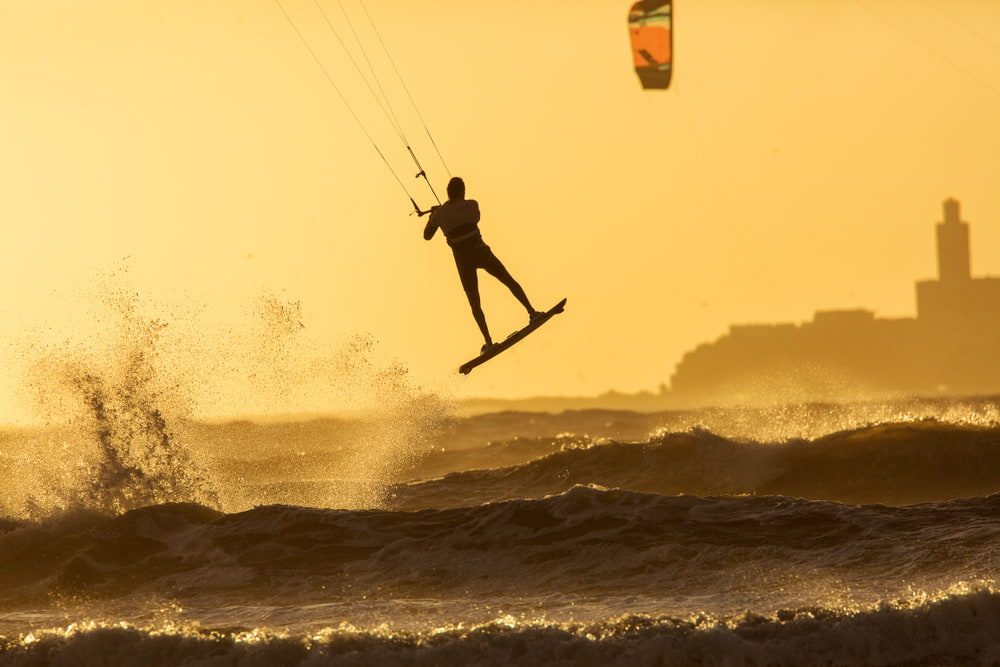
Outdoor Adventures: Beaches, Surfing, and More
Surfing and Kite Surfing: Essaouira’s strong Atlantic winds make it a prime destination for water sports enthusiasts. You can rent surfing equipment or take lessons at one of the surf schools located along the beach. Kite surfing is also popular, with Sidi Kaouki being one of the best spots for both beginners and experienced surfers.
Quad Biking: For those seeking adventure on land, quad biking along the sand dunes is a thrilling way to explore the outskirts of Essaouira. Guided tours take you through the dunes and along the beaches, providing stunning views of the Atlantic coastline.
Horseback Riding: Horseback riding is a more peaceful way to take in Essaouira’s natural beauty. You can book rides along the beach or through the nearby countryside. Local stables offer rides for all experience levels.
Discovering Local Cuisine: Must-Try Foods
Fresh Fish and Seafood: Essaouira is famous for its fresh seafood, and the best place to try it is right at the source. Visit the fish market near the port, choose your fish, and have it grilled on the spot. Sardines, calamari, and sea bass are popular options.
Moroccan Tajine: Tajine is a slow-cooked stew made with meat (often lamb or chicken), vegetables, and a variety of spices. It’s a staple in Moroccan cuisine and a must-try while in Essaouira. You’ll find it in most local restaurants, often served with couscous or bread.
Couscous: Another traditional Moroccan dish, couscous is typically served with vegetables, meat, and a rich broth. It’s a hearty and flavorful meal, perfect after a day of exploring.
Shopping in Essaouira: Markets and Artisans
Essaouira is known for its artisanal crafts, many of which are produced by local craftsmen using traditional techniques.
Argan Oil: Essaouira is one of the main regions for the production of argan oil. This versatile oil is used in both cooking and cosmetics. Many shops in the medina sell high-quality argan oil, often produced by women’s cooperatives.
Woodwork: Essaouira is famous for its intricate woodwork, particularly items made from thuya wood, a fragrant tree native to Morocco. Artisans create everything from small boxes to larger pieces of furniture, all hand-carved with detailed designs.
Jewelry and Textiles: The souks in Essaouira are full of beautiful silver jewelry, often set with semi-precious stones. You’ll also find colorful textiles, such as scarves, blankets, and carpets, all made by hand using traditional weaving techniques.
Nightlife and Entertainment Options
Essaouira has a relaxed but vibrant nightlife. Many bars and cafés offer live music, often featuring Gnaoua performances or other traditional Moroccan music.
Taros Café: This popular rooftop bar is a great spot to enjoy live music with a view of the ocean. The atmosphere is lively, and it’s a favorite among both locals and tourists.
Ocean Vagabond: Located near the beach, this laid-back café is a great place to unwind after a day of surfing. It offers a relaxed atmosphere with ocean views and serves a variety of drinks and snacks.
Day Trip Ideas from Essaouira
Sidi Kaouki: Just a short drive from Essaouira, this quiet beach is perfect for a peaceful day trip. It’s less crowded than the main beach in Essaouira and is ideal for surfing, sunbathing, or simply relaxing.
Marrakech: Only 2.5 hours away, Marrakech offers a bustling city experience in contrast to Essaouira’s laid-back vibe. A guided day trip can take you through the city’s famous souks, palaces, and gardens, allowing you to experience the vibrant energy of Morocco’s most famous city.
Practical Travel Tips for Essaouira
Here are some practical tips to help you make the most of your time in Essaouira.
Packing Essentials
Clothing: Light, breathable clothing is essential for the warm weather, but be sure to pack a jacket or windbreaker, as the coastal winds can make evenings cooler. Comfortable walking shoes are a must, especially if you plan on exploring the medina’s narrow streets.
Sunscreen and Sunglasses: The sun in Essaouira can be strong, even when the breeze makes the heat feel less intense. Sunscreen and sunglasses are essential for protecting yourself during outdoor activities.
Reusable Water Bottle: Staying hydrated is important, especially if you’re spending time at the beach or engaging in outdoor activities. A reusable water bottle is a convenient and eco-friendly way to ensure you always have water on hand.
Safety and Health Tips
Essaouira is generally a safe city for tourists, but it’s always wise to take basic precautions.
Pickpocketing: While Essaouira is safe, petty theft can happen in crowded areas like the medina. Keep your valuables secure, and be mindful of your surroundings.
Food and Water: Stick to bottled water to avoid any potential stomach issues, and be cautious when eating street food if you have a sensitive stomach. Essaouira’s restaurants are known for serving fresh, safe meals, but it’s always a good idea to eat at well-reviewed places.
Pharmacies: If you need any medical supplies or medications, pharmacies are widely available in Essaouira, and many pharmacists speak French and English.
Currency, Language, and Local Etiquette
Currency: The Moroccan Dirham (MAD) is the local currency. Credit cards are accepted in larger hotels and restaurants, but for small purchases in the medina, it’s best to carry cash.
Language: While Arabic is the official language, French is widely spoken, and many people in the tourism industry also speak English. A few basic phrases in French or Arabic (like “Salam” for hello) can go a long way in showing respect.
Local Etiquette: Morocco is a Muslim country, and it’s important to respect local customs. Dress modestly, especially when visiting religious sites, and always ask for permission before taking photos of people, particularly women.
Conclusion
Essaouira is a unique destination that offers something for every type of traveler. Its rich history, vibrant culture, and stunning coastal scenery make it a must-visit city in Morocco. Whether you’re exploring the medina, enjoying fresh seafood by the port, or taking part in one of the many outdoor activities, Essaouira promises an unforgettable experience. With its relaxed vibe and welcoming locals, it’s the perfect place to unwind while discovering the beauty of Morocco.
Frequently Asked Questions (FAQ)
What is Essaouira famous for?
Essaouira is known for its UNESCO-listed medina, beautiful beaches, strong winds ideal for surfing, and its annual Gnaoua World Music Festival.
How far is Essaouira from Marrakech?
Essaouira is about 180 kilometers from Marrakech, and the journey takes approximately 2.5 to 3 hours by bus or car.
Is Essaouira a good place for surfing?
Yes, Essaouira is a top destination for surfing, kite surfing, and windsurfing due to its consistent Atlantic winds. Sidi Kaouki is another nearby beach popular with surfers.
What should I wear in Essaouira?
Light, breathable clothing is recommended for the daytime, but bring a windbreaker or light jacket for the cooler evenings. Comfortable walking shoes are also essential for exploring the medina.
What are some must-try foods in Essaouira?
Be sure to try the fresh fish from the local port, Moroccan tajine, couscous, and traditional mint tea while in Essaouira.
